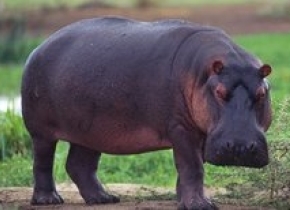
河马粪便污染淡水渔业
河马的粪便堆积在坦桑尼亚的淡水鱼群中——这对生物多样性来说是个坏消息,对我们的食物来源来说也是有害的。
撰文\播音:贾森·G·戈德曼(Jason G. Goldman)
翻译:邱燕宁
审校:郭晓
They weigh about 3,000 pounds and eat about 100 pounds of plants each day. So your average adult hippo produces quite a lot of poop. By some estimates, a single hippo blasts out more than 10 pounds of waste each day.
它们重约3000磅,每天吃大约100磅的植物,因而一般成年河马会产生很多粪便。据估计,一只河马每天会产生超过10磅的废物(粪便)。
And all that hippo dung gets mixed into the ponds and streams where they spend most of their time. We generally think of this process as beneficial, an ecosystem service, a way for nutrients to flow from terrestrial, streamside ecosystems into the water itself. Their dung is a sort of fertilizer for aquatic life.
所有的河马粪便都混入了池塘和溪流中,而河马在那些地方度过它们的大部分时间。我们通常认为这一过程是有益的,这是一种生态系统服务,是营养物质从陆地、河岸生态系统流入水体系统的一种方式。它们的粪便是水生生物的一种肥料。
And all of that is true—at least when water moves from pond to pond. At one time, many African waterways continued to flow even during the dry season. But people have diverted lots of that water for agriculture. So now, Tanzania's Great Ruaha River stops flowing during the dry season, leaving behind a serious of stagnant pools—in which the hippos keep on pooping.
所有这些都是事实——至少当水能从一个池塘流到另一个池塘时是如此。曾几何时,即使在旱季,非洲的许多水道仍在继续流动。但是人们把大量的水用于农业,导致现在坦桑尼亚的大鲁雅河在旱季停止了流动,留下了大量的滞水洼——而河马则继续在这里排泄粪便。
"Especially in these high density pools at the peak the dry season, there's a huge buildup of dung. So we ended up pulling up these nets that have no fish but are just filled with hippo dung."
“尤其是在这些高密度的池塘里,在严重的旱季期,会有大量的粪便堆积。所以我们最终只收获了这些没有鱼但却装满了河马的粪便的渔网。”
University of California, Santa Barbara, ecologist Keenan Stears. Unable to wash downriver, the nutrients build up while dissolved oxygen in the water decreases.
加州大学圣巴巴拉分校生态学家Keenan Stears说。由于水流无法向下游流动,营养物质不断积累,而水中的溶解氧不断减少。
"Changes in the chemistry can influence biodiversity within these pools as well. Specifically, fish as well as aquatic invertebrates."
“这些水池里的化学成分变化也会影响这里物种的多样性。特别是鱼类和水生无脊椎动物。”
Only a few types of fish can survive in these oxygen-poor aquatic environments for more than a few weeks. It's bad news for biodiversity, but it's also deleterious for the dinner plate. Tilapia are an important source of protein for communities that rely on the rivers for their food. Hippos reduced tilapia abundance by 41% across the watershed the researchers studied. The results were published in the Proceedings of the National Academy of Sciences. [Keenan Stears et al., Effects of the hippopotamus on the chemistry and ecology of a changing watershed.]
在这些缺氧的水生环境中,只有少数几种鱼类能够存活数周以上。这对生物多样性来说是坏消息,对我们的食物来源来说也是有害的。对依赖河流作为食物来源的群落来说,罗非鱼是它们重要的蛋白质来源。在研究人员研究的分水岭地区,河马减少了41%的罗非鱼数量。研究结果发表在《美国国家科学院院刊》(Proceedings of the National Academy of Sciences)上。
There is some hope, though. When the wet season returns and the rivers start to flow again, things can return to normal—if we're careful.
不过,还是有希望的。当雨季回来,河流又开始流动时,如果我们小心的话,一切都会恢复正常。
"But what our results do show is its not all doom and gloom. This resetting of the system when flow resumes shows that there is some kind of resilience within the system. And if we are able to manage the off-take of water from these rivers, the system is able to actually recover in terms of repopulating these pools in terms of biodiversity and abundance."
“但我们的结果确实显示,并非所有的前景都是黯淡的。当水流恢复时,系统的重新恢复表明系统内部存在某种弹性。如果我们能够管理从这些河流中抽取水的行为,那么在水塘再生方面,在生物多样性和丰富度方面,这个系统就能真正实现恢复。”
未经书面许可任何人不得复制或镜像
京ICP备11000850号-1
 京公网安备11010502039775号
京公网安备11010502039775号 信息网络传播视听节目许可证0111611号
国家科技基础条件平台

















